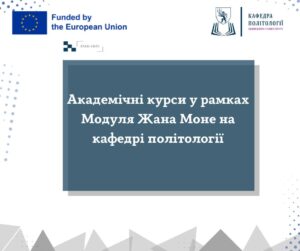As part of the module “Political Institutions and Systems in Europe: Comparison and Experience for Ukraine”, students pursuing higher education majoring in political science are invited to listen to and familiarize themselves with the following two academic courses:
“Comparative political science: political institutions and systems of the countries of Western Europe”, lecturer – doctor of political sciences, professor Anatoliy Romanyuk. The course is aimed at students of the fourth year of the bachelor’s degree in political science. According to the results of passing the discipline, students take an exam.
“Comparative analysis of political institutions and systems of Central and Eastern European countries”. Lecturer – doctor of political sciences, professor Vitaly Lytvyn. The course is implemented for first-year master’s students. At the end of the course, each of his listeners also takes an exam.
Both courses in our Jean Monet Module have the word “comparative” in their title. And what is the essence of this branch of science – comparative political science and comparative political analysis?
Let’s figure it out together!
A comparative or comparativist approach involves the comparison of several political objects or phenomena (the most common is the case when two objects are taken into account – binary analysis – although case studies, regional and universalist comparisons, etc. are also possible). The criteria for comparative analysis are common features – constants – or diametrically opposite cases, under the conditions of which one or another object is indexed and analyzed.
Such a method for the study of political phenomena, institutions and processes was used by thinkers even in the Antiquity era. For example, the ancient Greek theorist Aristotle is known for his effective comparison of forms of government, during which he distinguished the right and wrong forms of government: polity, monarchy, aristocracy and tyranny, oligarchy and democracy, respectively.
Basically, the methodology of comparative political science was singled out and formed at the end of the 19th century, which was justified by the publication of E. Freeman’s book “Comparative Politics”. In his work, the author used the methods of comparative politics and philosophy, with the help of which he investigated how the common roots of origin can affect the similarity of different nationalities, etc.
Comparativists also take into account the circumstances and external conditions in which a comparative analysis is conducted: territorial determination, prevalence of institutions, dynamism of measured phenomena, singularity or repeatability of the object under study, etc. Depending on this, regional comparisons, cross-temporal comparisons (taking into account time), thematic comparisons, global comparisons, etc. are distinguished.
And how are the objects for comparison chosen? Are there any defining criteria?
Usually, when forming a set of collected data and preparing them for analysis, researchers rely on (neo)institutional and functional approaches of political comparison. The essence of the (neo)institutional approach is that when defining the researched objects, similar institutions and processes are singled out, and its goal is to derive differences and similarities from the normative state of institutions and processes. According to the functional approach, attention is first of all focused on the practical application of the objects selected for analysis, the excellent is evaluated in comparison with the relevance of the objects to the achievement of the same goals or activities in politics. Very often, both approaches are combined, thereby making the comparative study more complex.
It is also interesting that forecasts of the future socio-political situation and reality are often built on the basis of the comparativist methodology, because the comparative analysis is empirically fundamental, which allows you to check the reliability and effectiveness of hypotheses regarding certain political phenomena and processes. If a certain “political law” works, then this gives reason to believe that it is possible to predict the future course of events in the political arena.
The academic courses were organized with the financial support of the European Union as part of the “Erasmus+ Program” under the direction “Jean Monnet for higher education” (Module “Political institutions and systems in Europe: comparison and experience for Ukraine”, No. 101126702).
Funded by the European Union. However, the views and opinions expressed are solely those of the author(s) and do not necessarily reflect the views of the European Union or the European Executive Agency for Culture and Education. Neither the European Union nor the grantor can be held responsible for them.
